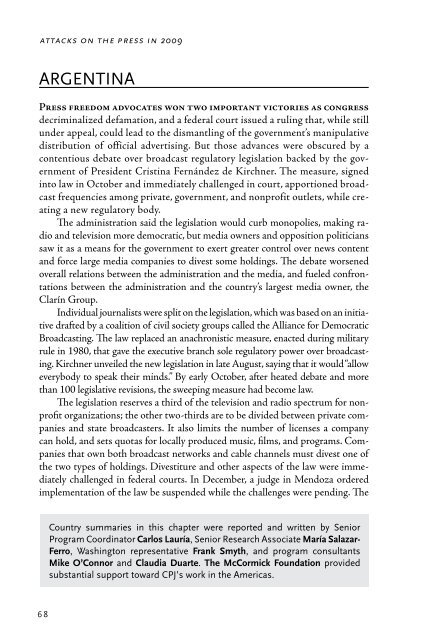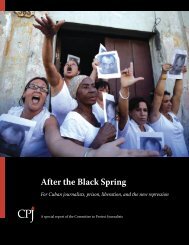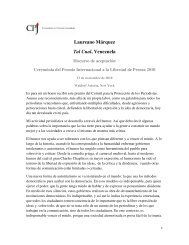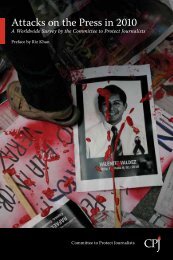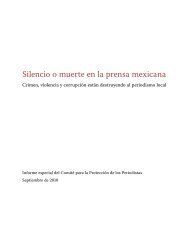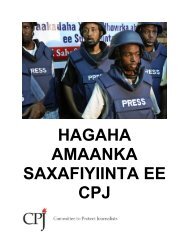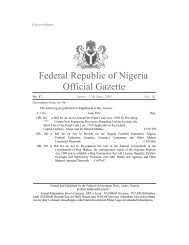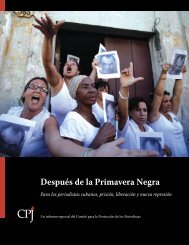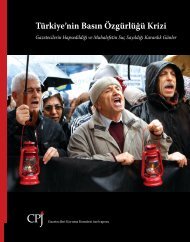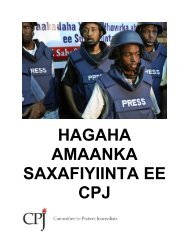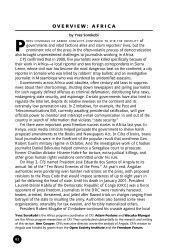Attacks on the Press - Committee to Protect Journalists
Attacks on the Press - Committee to Protect Journalists
Attacks on the Press - Committee to Protect Journalists
- No tags were found...
Create successful ePaper yourself
Turn your PDF publications into a flip-book with our unique Google optimized e-Paper software.
attacks <strong>on</strong> <strong>the</strong> press in 2009americas: argentinaARGENTINA<strong>Press</strong> freedom advocates w<strong>on</strong> two important vic<strong>to</strong>ries as c<strong>on</strong>gressdecriminalized defamati<strong>on</strong>, and a federal court issued a ruling that, while stillunder appeal, could lead <strong>to</strong> <strong>the</strong> dismantling of <strong>the</strong> government’s manipulativedistributi<strong>on</strong> of official advertising. But those advances were obscured by ac<strong>on</strong>tentious debate over broadcast regula<strong>to</strong>ry legislati<strong>on</strong> backed by <strong>the</strong> governmen<strong>to</strong>f President Cristina Fernández de Kirchner. The measure, signedin<strong>to</strong> law in Oc<strong>to</strong>ber and immediately challenged in court, apporti<strong>on</strong>ed broadcastfrequencies am<strong>on</strong>g private, government, and n<strong>on</strong>profit outlets, while creatinga new regula<strong>to</strong>ry body.The administrati<strong>on</strong> said <strong>the</strong> legislati<strong>on</strong> would curb m<strong>on</strong>opolies, making radioand televisi<strong>on</strong> more democratic, but media owners and oppositi<strong>on</strong> politicianssaw it as a means for <strong>the</strong> government <strong>to</strong> exert greater c<strong>on</strong>trol over news c<strong>on</strong>tentand force large media companies <strong>to</strong> divest some holdings. The debate worsenedoverall relati<strong>on</strong>s between <strong>the</strong> administrati<strong>on</strong> and <strong>the</strong> media, and fueled c<strong>on</strong>fr<strong>on</strong>tati<strong>on</strong>sbetween <strong>the</strong> administrati<strong>on</strong> and <strong>the</strong> country’s largest media owner, <strong>the</strong>Clarín Group.Individual journalists were split <strong>on</strong> <strong>the</strong> legislati<strong>on</strong>, which was based <strong>on</strong> an initiativedrafted by a coaliti<strong>on</strong> of civil society groups called <strong>the</strong> Alliance for DemocraticBroadcasting. The law replaced an anachr<strong>on</strong>istic measure, enacted during militaryrule in 1980, that gave <strong>the</strong> executive branch sole regula<strong>to</strong>ry power over broadcasting.Kirchner unveiled <strong>the</strong> new legislati<strong>on</strong> in late August, saying that it would “alloweverybody <strong>to</strong> speak <strong>the</strong>ir minds.” By early Oc<strong>to</strong>ber, after heated debate and morethan 100 legislative revisi<strong>on</strong>s, <strong>the</strong> sweeping measure had become law.The legislati<strong>on</strong> reserves a third of <strong>the</strong> televisi<strong>on</strong> and radio spectrum for n<strong>on</strong>profi<strong>to</strong>rganizati<strong>on</strong>s; <strong>the</strong> o<strong>the</strong>r two-thirds are <strong>to</strong> be divided between private companiesand state broadcasters. It also limits <strong>the</strong> number of licenses a companycan hold, and sets quotas for locally produced music, films, and programs. Companiesthat own both broadcast networks and cable channels must divest <strong>on</strong>e of<strong>the</strong> two types of holdings. Divestiture and o<strong>the</strong>r aspects of <strong>the</strong> law were immediatelychallenged in federal courts. In December, a judge in Mendoza orderedimplementati<strong>on</strong> of <strong>the</strong> law be suspended while <strong>the</strong> challenges were pending. TheCountry summaries in this chapter were reported and written by SeniorProgram Coordina<strong>to</strong>r Carlos Lauría, Senior Research Associate María Salazar-Ferro, Washingt<strong>on</strong> representative Frank Smyth, and program c<strong>on</strong>sultantsMike O’C<strong>on</strong>nor and Claudia Duarte. The McCormick Foundati<strong>on</strong> providedsubstantial support <strong>to</strong>ward CPJ’s work in <strong>the</strong> Americas.t o p developments»»New broadcast law sparks c<strong>on</strong>tentiousdebate, raises c<strong>on</strong>cerns.»»In major vic<strong>to</strong>ry, criminal defamati<strong>on</strong>laws are repealed.200key statisticTax agents who raidedClarín in apparent reprisalfor <strong>the</strong> newspaper’s coverage.government said it would appeal.Most Argentine journalists said <strong>the</strong> military-era broadcasting rules neededan overhaul, but some worried <strong>the</strong> new law would limit free expressi<strong>on</strong>. The compositi<strong>on</strong>of <strong>the</strong> new regula<strong>to</strong>ry body was at <strong>the</strong> center of <strong>the</strong> argument. The lawrequires <strong>the</strong> new regula<strong>to</strong>r be composed of seven members—two appointed by<strong>the</strong> president, three by C<strong>on</strong>gress, and two by a federal council made up mostly ofgovernors with some civil society representatives. “The regula<strong>to</strong>r will rely heavily<strong>on</strong> political appointees, and <strong>the</strong> executive will have a lot of power in nominatingits members and c<strong>on</strong>trolling its functi<strong>on</strong>s,” warned Adrián Ventura, a columnistfor <strong>the</strong> daily La Nación and a <strong>to</strong>ugh government critic. Detrac<strong>to</strong>rs also pointed<strong>to</strong> vague definiti<strong>on</strong>s in <strong>the</strong> text that <strong>the</strong>y said could allow <strong>the</strong> new regula<strong>to</strong>r <strong>to</strong>revoke broadcast licenses.Supporters countered that if <strong>the</strong> government wanted <strong>to</strong> exert c<strong>on</strong>trol over<strong>the</strong> media, it already had an effective <strong>to</strong>ol in <strong>the</strong> 1980 law. Backers includedFrank La Rue, a U.N. special rapporteur <strong>on</strong> freedom of expressi<strong>on</strong>, who called<strong>the</strong> new law “an example <strong>to</strong> o<strong>the</strong>r countries.” Horacio Verbitsky, famed columnistfor <strong>the</strong> daily Página 12 and president of <strong>the</strong> human rights organizati<strong>on</strong>Centro de Estudios Legales y Sociales, said <strong>the</strong> law represented “a significantstep forward <strong>to</strong>ward <strong>the</strong> enrichmen<strong>to</strong>f a democratic debatethrough a more pluralisticaccess <strong>to</strong> informati<strong>on</strong>.”CPJ found that while <strong>the</strong>legislati<strong>on</strong> is an importantimprovement over <strong>the</strong> 1980law, its provisi<strong>on</strong>s could bemisused for political purposes.In particular, CPJ saidit would m<strong>on</strong>i<strong>to</strong>r whe<strong>the</strong>r<strong>the</strong> regula<strong>to</strong>ry agency is subjected<strong>to</strong> undue political influence.Despite government denials, many analysts said <strong>the</strong> legislati<strong>on</strong> was alsoaimed at weakening <strong>the</strong> Clarín Group, owner of newspapers, radio stati<strong>on</strong>s, andboth broadcast and cable televisi<strong>on</strong> outlets. Clarín, an Internet service provider aswell, has produced critical coverage of <strong>the</strong> Kirchner administrati<strong>on</strong>. The legislativedebate escalated existing animosity between <strong>the</strong> administrati<strong>on</strong> and Clarín.The administrati<strong>on</strong> and its allies lashed out at Clarín for what <strong>the</strong>y perceived <strong>to</strong>be biased coverage, most notably in June electi<strong>on</strong>s in which Kirchner’s Per<strong>on</strong>istparty lost its c<strong>on</strong>gressi<strong>on</strong>al majority.6 86 9


